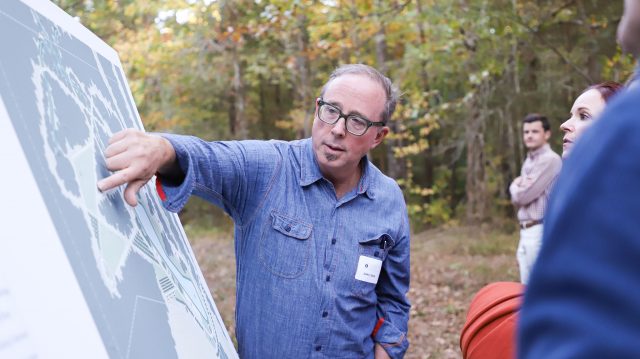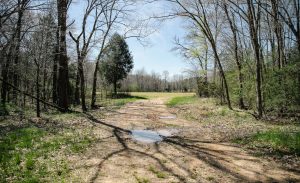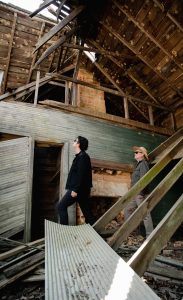
John T. Edge, director of the Mississippi Lab, shares plans for the writer’s residency at Greenfield Farm. Writers will stay in modern dogtrot cabins, farmhouse and hunting cabin ruins will be restored, and hiking trails and bridges will wind around the farm. Photo by Kirsten Simpson/University Development
OXFORD, Miss. – A new University of Mississippi project aims to create a retreat-style writer’s residency that will afford 50-plus writers a year the time and space to imagine and execute big projects.
The location? A 20-acre plot of land with a storied history involving one of the nation’s most treasured literary giants. Now owned by the university, Greenfield Farm was once Nobel prize-winning author William Faulkner’s mule farm.
“This is a metaphorically and physically important space,” said John T. Edge, director of the Mississippi Lab, who is spearheading the residency’s planning effort. “The road leads to Faulkner’s birthplace. By purchasing this land, Faulkner bought access to his past. On this farm, he tapped into Mississippi’s narratives.
 “At a later juncture in his life, Faulkner advocated for a writer’s residency much like we are imagining.”
“At a later juncture in his life, Faulkner advocated for a writer’s residency much like we are imagining.”
Greenfield Farm will act as a welcoming “front porch” for novelists, poets, songwriters, playwrights, essayists, nonfiction writers – essentially anyone who wishes to make words. The residency will attract writers from Mississippi and writers who make Mississippi their subject.
“We depend heavily on writers to tell our story in Mississippi,” Edge said. “I’d argue that writing is one of our state’s leading cultural and economic outputs. With the creation of this residency, we are making an infrastructure investment to support that work.”
In addition, Greenfield Farm will be a place for Ole Miss students, faculty and staff. They could be composing theses, completing dissertations or using their dissertations to write first books.
Residencies provide a place for writers and artists to focus intently on their work, minus the daily disruptions of life. More than 300 of them are located across the nation, but most are clustered along the East Coast and West Coast. There is no nonprofit stipend-supported writer residency operating in Mississippi.

A 1952 documentary about novelist William Faulkner shows him at Greenfield Farm riding a tractor, walking the grounds and chatting with farmers. Submitted image
“There is no other residency like this,” said Beth Ann Fennelly, UM professor of English and Mississippi poet laureate from 2016 to ’21. “Most residencies charge the working artist a fee to attend.
“That narrows the application pool a good bit – suddenly, the only people who can apply are those well off enough to take time off work and pay a fee of, say, $500 a week.
“Greenfield Farm upends that model by granting a stipend to those who can attend, democratizing the field for artists of all backgrounds.”
Greenfield will offer $1,000 weekly stipends to ensure that writers of all economic classes will have the ability to apply. Its 50-plus annual residents will stay an average of three weeks and pay no fees.
Noel Wilkin, UM provost and executive vice chancellor for academic affairs, said he could not think of a better use for Faulkner’s former farm.
“Mississippi is well known for its creative people, which include writers, poets, songwriters, playwrights, novelists and artists,” Wilkin said. “Creativity requires perspective and concentration. We have a unique opportunity to use land that is steeped in Mississippi history to help embrace and nurture the creative economy.

Greenfield Farm is a 20-acre plot of land once owned by William Faulkner that sits 15 miles east of Oxford. The university plans to turn the property into a retreat-style writer’s residency. Photo courtesy Travis Crabtree
“By creating Mississippi’s only nonprofit, stipend-supported, writer’s residency – a place where writers can reside for a period of time to concentrate and create – we will be creating a place to support and foster to the work of current and future Mississippi writers.”
Once the residency was conceptualized in 2021, some of the initial steps were to research the property itself, map the topography of the land and illustrate its best use, Edge said. The resulting project plan pays tribute to the farm’s history.
Edge recruited Jim Gulley, a master’s student in history from Brookhaven, to conduct a deep dive into the farm’s past. He traced it from Native American usage up to the Faulkner family’s purchase in 1938. His findings indicate that no enslaved people worked the land.
“He built a cabin for himself that was called the hunting lodge,” Gulley said. “He would spend the night out there. And we know what novels he was working on: ‘Go Down, Moses’ and ‘The Hamlet.’ Those were the two primary ones that were Yoknapatawpha-related.”
Ralph Eubanks, faculty fellow and author of “A Place Like Mississippi,” suspects that Faulkner would be pleased with the plans for his farm.

Travis Crabtree (left), of Tree Design Co. in Jackson, and donor Ray Neilsen explore one of the remaining structures at Greenfield Farm during a site visit. Plans call for the remaining structures at the farm to be restored and used as part of the writer’s residency. Photo courtesy Travis Crabtree
“I think he would be happy to know that a place that he loved is being used to help the next generation of Mississippians and Southern writers to flourish,” Eubanks said. “Yes, it was his mule farm, and he had an identity of a farmer, but let’s be honest, Faulkner was not much of a farmer.
“He used that persona to be accepted in the community. To have Greenfield turned into a place where artists are accepted for who they are – I think he’d be nodding his head and saying, ‘Yeah, I like that idea.'”
When Ray Neilsen first learned of the project from Edge, he knew he had to be involved.
“Building Greenfield Farm is an important step to strengthening our literary foundation,” said Neilsen, an Edwards-based philanthropist who made the first gift to support the project. “We have a unique opportunity to build upon Oxford and Mississippi’s literary tradition and to grow writers, while also fostering a more authentic, interesting place on land once owned by William Faulkner.”
Fundraising for the grounds and building is underway. Construction is scheduled to begin in the first quarter of 2024, with a grand opening in the third quarter of 2025.
To learn more about the Greenfield Farm writer’s residency and how to get involved or support the project, contact Hughes Miller, director of industry giving and engagement, at hughes@olemiss.edu or 901-490-0622.